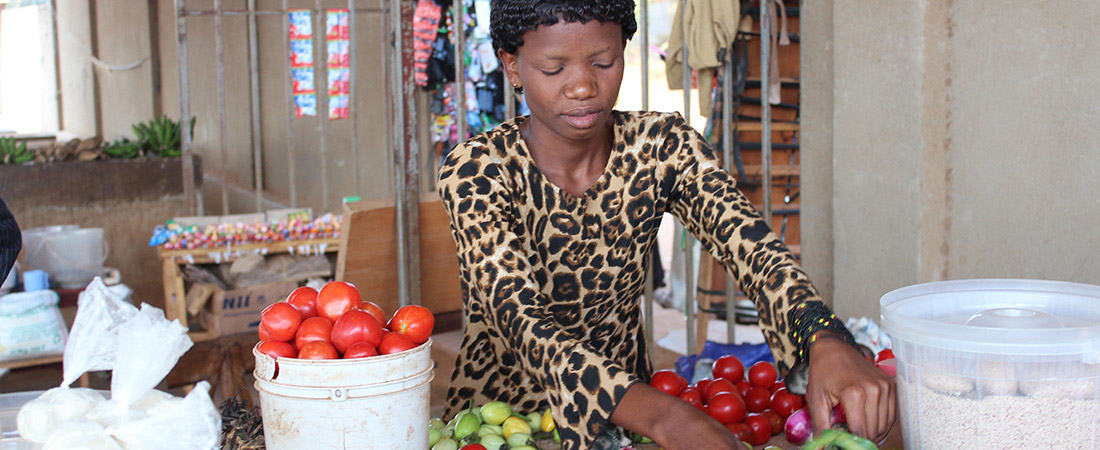A Measure of Success

Since 2009, Akazi Kanoze has provided workforce training to more than 18,000 youth in Rwanda. A recent impact evaluation found the following:
- All youth in Akazi Kanoze showed significant gains in work readiness skills compared to the control group.
- Young women in Akazi Kanoze made more significant gains in work readiness skills than did young men in the program.
- Youth participating in Akazi Kanoze were more likely to be employed than young people who were not in the program.
Success didn’t come overnight for Euphrasie, a 23 year old in rural Rwanda. But with hard work, this former seed farmer has built a small business selling non-alcoholic sorghum beer—an enterprise she intends to keep growing.
For Euphrasie, it’s more than just a change in career. It’s a change in quality of life—from subsistence to sustainability—that was made possible by EDC’s USAID-funded Akazi Kanoze program.
A new study shows just how important the project is. EDC’s Annie Alcid, who authored the study, says that the data show what Euphrasie and other Akazi Kanoze graduates have been telling her: the program’s approach is making a difference.
Q: What kind of work is typically available to young people in rural regions of Rwanda?
Alcid: Subsistence agriculture is common. There are also some jobs in building construction, but those jobs are often temporary. Young people really have to be entrepreneurial to make a good living. We found that a lot of young people were drawn to Akazi Kanoze because they were interested in starting their own businesses, but they knew they had to develop better financial and entrepreneurial skills to achieve their dream.
Q: What did youth gain from participating in Akazi Kanoze?
Alcid: Akazi Kanoze uses a comprehensive package of services, including work readiness training, technical training, internship placement, and mentorship to train youth in a number of soft skills, such as financial management, leadership, communication, and work conduct. We know these skills are crucial to moving young people from subsistence lifestyles to ones where they have a long-term vision. The project also matches young people with local businesses that already exist in the community. We have even had employers ask for all of their employees to be trained through Akazi Kanoze!
Q: You recently completed a year-long impact evaluation of Akazi Kanoze. What did you find?
Alcid: We studied whether the project increased young people’s work readiness skills and levels of employability in rural areas. We found that graduates of Akazi Kanoze were 12 percent more likely to be employed than youth who did not participate. We’ve had anecdotal evidence for years that this was the case, but this is the first time that numbers are telling us how much of an impact the project is having. We also found that youth who participated in Akazi Kanoze made significant gains in their knowledge of financial management and other work readiness skills.
Q: Why are these results important?
Alcid: It’s difficult to see huge gains in employment outcomes in a one-year study, so we also looked for those intermediate successes that show youth are developing the personal and financial skills needed to be successful in the local economy. And that’s what this study showed. Now we know our approach—pairing soft skills training with mentorship and technical training—is on the right track.
Personal success stories also paint a colorful picture of the program’s success. When I was in Rwanda, I met a young man named Pierre who had dreams of starting his own business but who had no start-up capital. This is a common situation for many young people there, especially in rural areas. Akazi Kanoze helped Pierre identify ways that he could save money. Before long he had put these lessons to use, and he went into business making sambosas, which are vegetable-filled pastries.
Pierre wasn’t an overnight success. His initial attempt at building a business failed and so did his second. He had to keep saving money. And he kept applying lessons from Akazi Kanoze, such as how to do basic market research, and his business finally took off. Now, he sells about 500 sambosas a day in five markets, and his business also employs seven other people. That’s the epitome of what Akazi Kanoze is about. Pierre used the skills he learned to make a better life for himself and for others in his community.